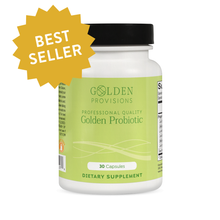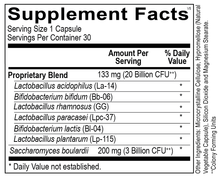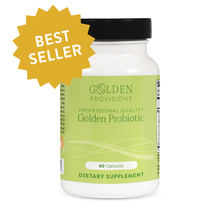Everyday Gut Support with Added Protection
Golden Probiotic offers foundational gut and immune support with a little something extra—thanks to the inclusion of Saccharomyces boulardii, a powerful probiotic yeast known for helping restore balance during digestive stress, antibiotic use, or travel. This daily formula delivers 20 billion CFUs across seven research-backed strains, including Lactobacillus rhamnosus GG and Lactobacillus plantarum, chosen for their ability to survive the harsh journey through the digestive tract.
If you’ve struggled with gut imbalances, frequent antibiotic use, or immune dips tied to digestion, this formula goes beyond standard probiotics by reinforcing your body’s first line of defense—your gut barrier—and supporting microbial balance when life throws you off track.
Looking for a higher-dose, broad-spectrum probiotic for general maintenance? Pro-Biome delivers 50 billion CFUs across 10 strains with added prebiotics—ideal for daily digestive and immune support when your system just needs a steady tune-up.
Why We Love It
-
20 billion CFU across 7 well-researched strains, including S. boulardii
-
Helps maintain healthy microflora balance and gut regularity
-
Promotes immune strength via improved gut barrier function
-
Shelf-stable formula with targeted delivery—no refrigeration needed
-
Complements digestive and detox protocols
What It Helps With
✔ Occasional gas, bloating, or irregularity
✔ Gut balance after antibiotics or travel
✔ Immune resilience and mucosal defense
✔ Nutrient absorption and digestive comfort
✔ General gut maintenance and microbiome diversity
What’s Inside
Proprietary Probiotic Blend (20 Billion CFU)
-
Lactobacillus acidophilus (La-14) – Supports mineral absorption and protects against harmful bacteria.
-
Lactobacillus rhamnosus (GG) – Highly studied for gut health and immune modulation.
-
Lactobacillus paracasei (Lpc-37) – Reinforces gut lining and reduces immune reactivity.
-
Lactobacillus plantarum (Lp-115) – Produces antimicrobial compounds and enhances barrier function.
-
Bifidobacterium bifidum (Bb-06) – Helps crowd out unwanted organisms and balance pH.
-
Bifidobacterium lactis (Bl-04) – Promotes regularity and a calm, balanced immune response.
Saccharomyces boulardii (3 Billion CFU) – A probiotic yeast shown to restore microflora, support sIgA production, and protect against microbial imbalance.
How It Works
🛡 Strengthens the Gut Barrier
Protects the gut lining and supports tight junction integrity for better digestion and immune defense.
🌿 Restores Microbial Balance
Helps rebalance gut flora after disruptions like antibiotics, stress, or poor diet.
✨ Promotes Daily Digestive Comfort
Reduces bloating, promotes regularity, and aids nutrient breakdown and absorption.
🦠 Includes S. boulardii for Extra Resilience
This unique probiotic yeast supports immune regulation and reinforces gut microbial diversity.
When to Use It
-
Daily for general digestive and immune support
-
After antibiotics or GI illness
-
While traveling or under stress
-
Alongside gut healing or detox protocols
Suggested Use
Take 1 capsule per day or as directed by your healthcare provider. No refrigeration required.
Clean & Pure
Gluten-Free | Corn-Free | Vegan Capsules
No Artificial Colors or Flavors | Shelf-Stable Formula






